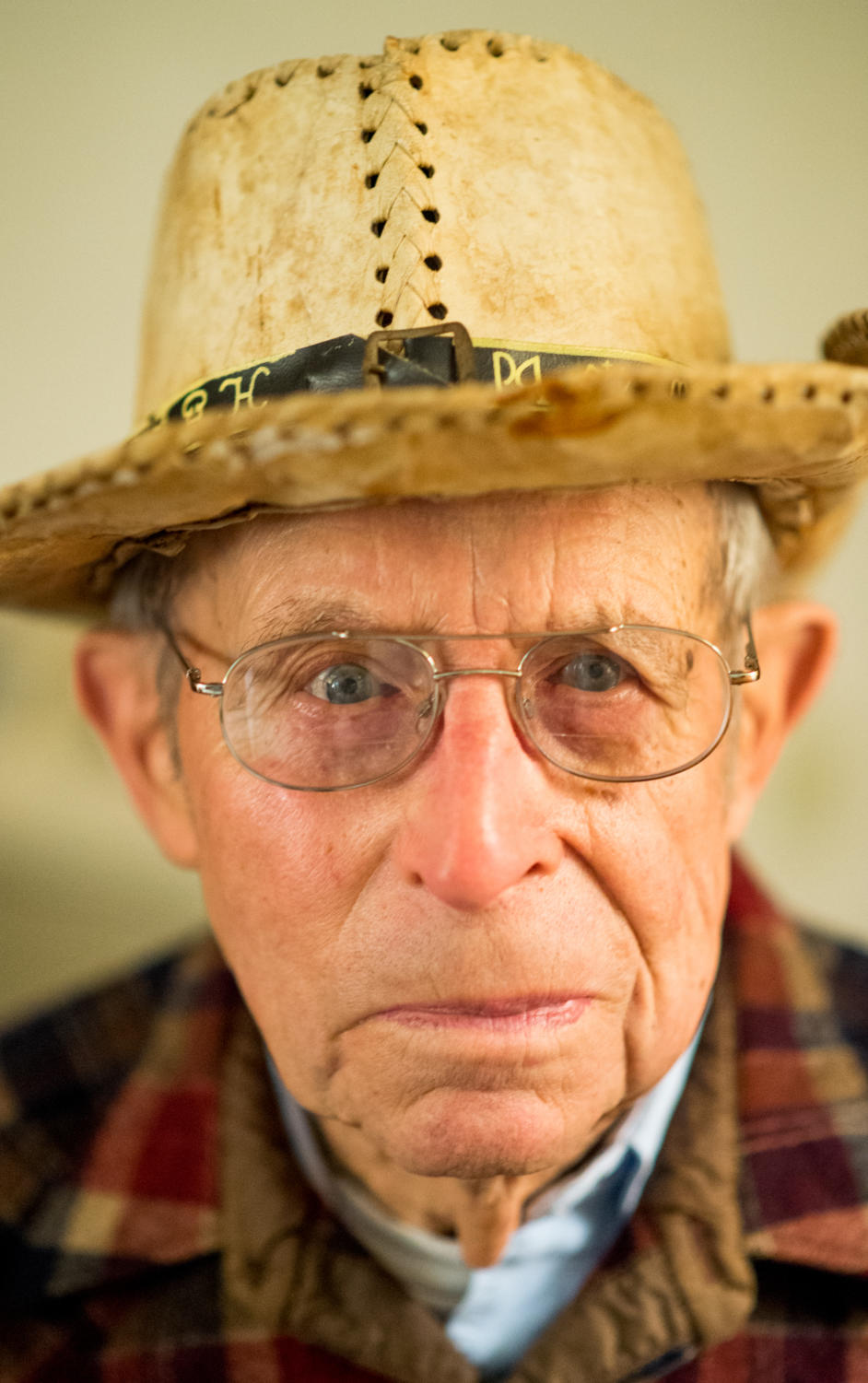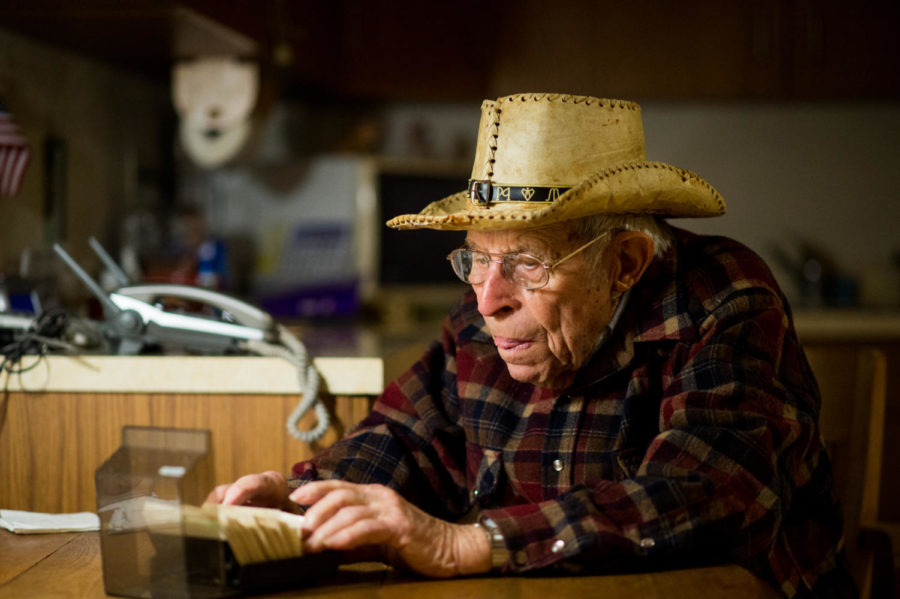WWII veteran reflects on his time at war, Veterans Day
World War II veteran Calvin Maginel, of Anna, looks through a Rolodex Friday, Nov. 10, 2017, at his home in Anna. (Brian Muñoz | @BrianMMunoz)
November 11, 2017
Several times a week, 93-year-old World War II veteran Cal Maginel puts on his favorite cowboy hat and goes to tend to the garden at the Illinois Veterans Home of Anna.
This is his way of remembering his wife of 67 years, Cathie, who passed away last year.
“It really took a toll on me,” Maginel said. “She’s really still a part of me.”
Advertisement
Maginel grew up as an only child in the South Side of Chicago when the Roaring Twenties gave way to the Great Depression.
In October 1942, when he was 18 years old, Maginel was studying anthropology at Knox College in Galesburg when he joined the U.S. Army to fight in World War II.
“I could see that I wanted to get out of Knox because I didn’t belong there,” Maginel said. “The war was on, and I just felt I should be part of it.”
He was in the Reserve Officers’ Training Corps at Knox when the U.S. government called for him to serve in the war. He said he left to fight and never returned to that campus.
“I had other ideas, I met other people, had different thoughts about what I wanted to do when the war ended, and I was headed toward optometry,” Maginel said.
Maginel was at war for three years serving in the 75th Infantry Division, where he learned to read Morse code working within a communications company in his division.
After spending time in Wales and France for training, Maginel said he was sent to Holland to fight on the front line.
Advertisement*
“We were in Belgium when the Germans broke through,” Maginel said, referring to the Battle of the Bulge. “So they decided we wouldn’t go to Holland, but go just right into the combat.”
Maginel said his battalion stayed in Belgium for six weeks as the battle raged on, eventually ending on Jan. 24, 1945.
In March of 1945, after moving through Holland to Germany, he said they crossed the Rhine River.
“Shortly after that, the pocket they call the Ruhr Pocket was completely encircled,” Maginel said. “We had the germans completed encircled. After a week or so, the Germans said, ‘Gee, this is stupid, we better just raise our hands.’”
After the war, Maginel said there was a point system that counted how many medals a soldier received, the number of children they had and how long they were overseas.

World War II veteran Calvin Maginel, of Anna, poses for a portrait Friday, Nov. 10, 2017, at his home in Anna. (Brian Muñoz | @BrianMMunoz)
Maginel said he fell in the middle, and didn’t have enough points to be discharged. He was sent to Europe to study until he qualified.
“I was lucky enough to have the qualifications to go back to England and study at Shrivenham American University,” Maginel said. “Gee, that was nice.”
On the way to England, Maginel met Sam Harmon, a soldier coming back from Germany.
Waiting for the ship to cross the English Channel, Maginel said he and Harmon would occasionally talk over a glass of wine, discussing what they would do when they got out of the service.
“By that time, the war with the Japanese had ended,” Maginel said. “We figured we were going to go home. That was the next move.”
Harmon impressed Maginel, he said, because his uncle was an optometrist in Evansville, Indiana. He said Harmon spoke so well of his uncle’s profession that Maginel decided to study optometry at Northern Illinois College of Optometry.
After graduating, Maginel settled down in Galva, where he practiced optometry and raised a family of four boys.
He joined Rotary International there, a service organization with the motto, “Service Above Self.” He said he carried this into his professional life, too.
“If somebody came in and I was aware of the fact that they needed help and didn’t have the money to do it, the job was done,” Maginel said. “If they paid me a year from then, that’d be fine. If they didn’t pay me, that’s fine too.”
In 1985, he retired to Jonesboro with his wife.
Maginel said during retirement he and his wife fell in love with a 244-and-a-half acre plot of land in Alexander County. Those acres became a ranch and a rattlesnake habitat, he said. The ranch is still managed today by Maginel, his son Jim and his daughter-in-law Mary.
“I don’t know how many active rattlesnakes on our acres, but many,” Maginel said. “Anyone who goes there is told, ‘Why yes they are here, just don’t mess with them. Leave them alone, keep your eyes open, and they’re not going to chase you.’”
Today, dressed in a wool plaid flannel and green pants and sitting in his apartment at the veterans home, Maginel said he still thinks of Veterans Day as Armistice day, the name it went by until 1954.
“It was a special day, of course,” Maginel said. “It was a big war, it lasted for a long time and I thought it was a good name; Armistice, because they got together and said ‘We’re just not going to do this anymore. We’ve been doing something stupid.’”
He said the day is meant to celebrate military members continuing to serve in addition to soldiers past.
“It’s tough fighting against someone that you don’t even know is your enemy,” Maginel said. “I certainly appreciate what these guys are doing now.”
Staff writer Amelia Blakely can be reached at ablakely@dailyegyptian.com or on Twitter @AmeilaBlakely.
To stay up to date with all your southern Illinois news, follow the Daily Egyptian on Facebook and Twitter.
Advertisement










Army Vet • Nov 12, 2017 at 5:27 pm
A true hero.